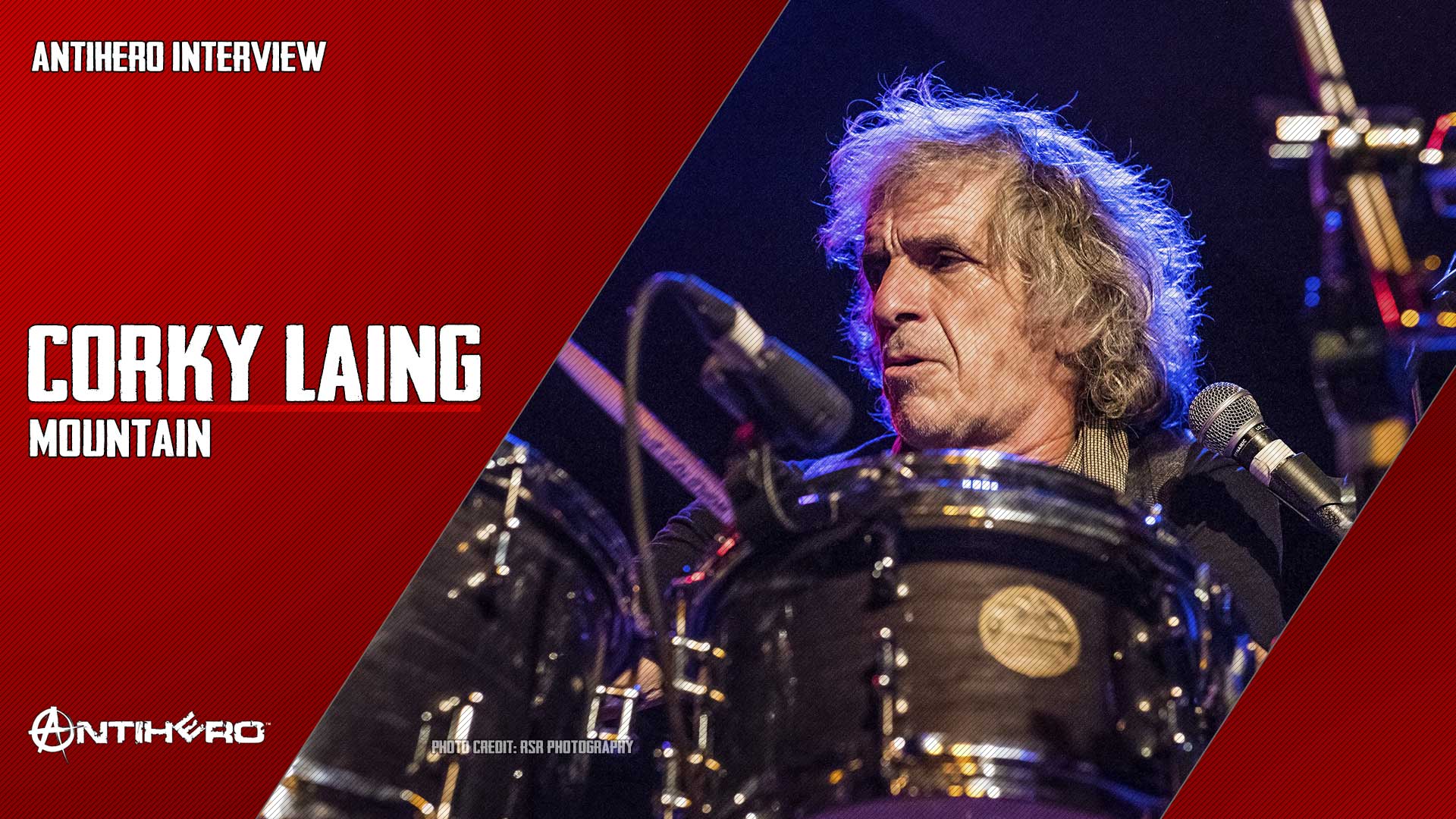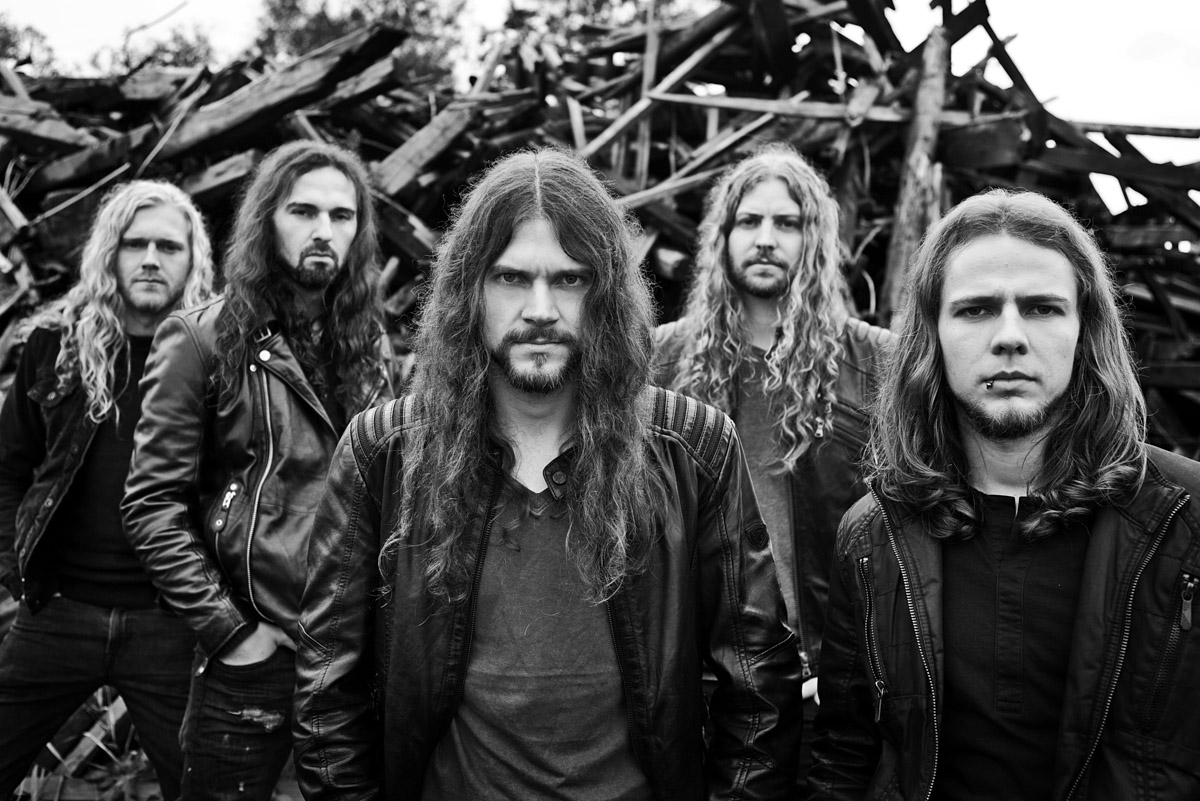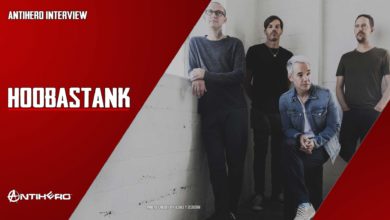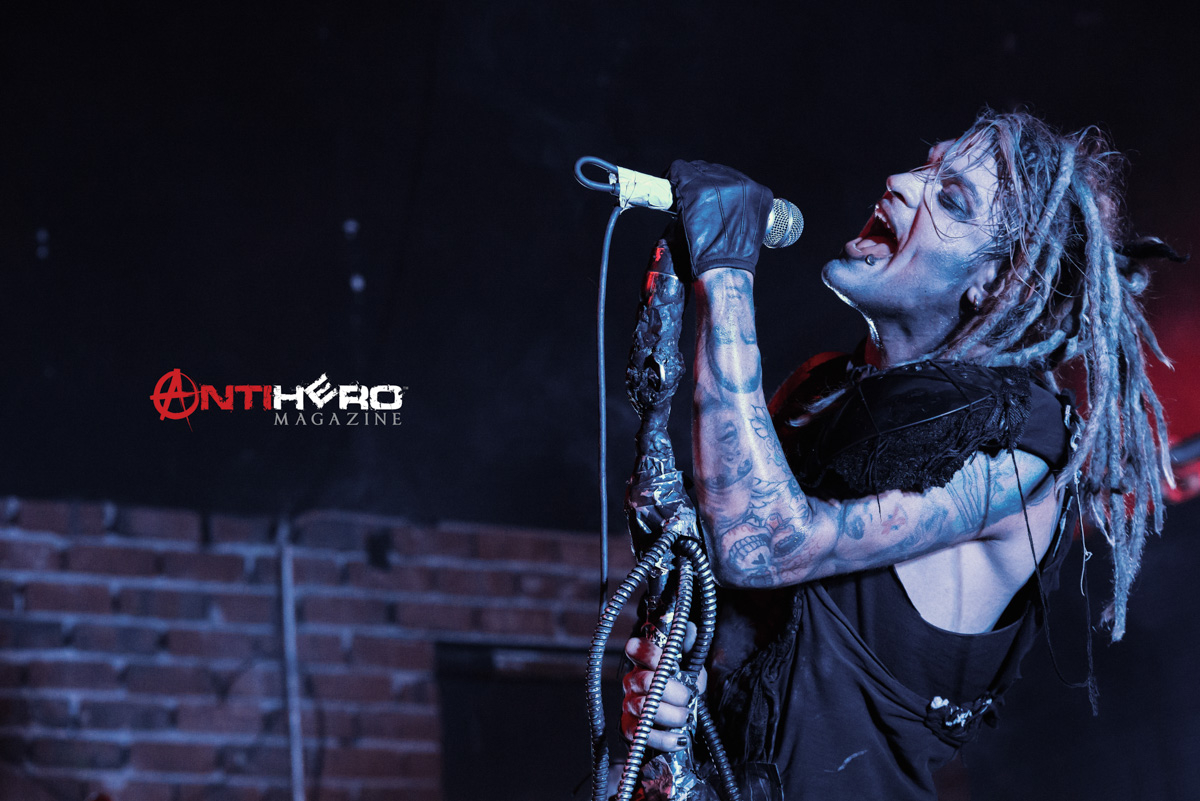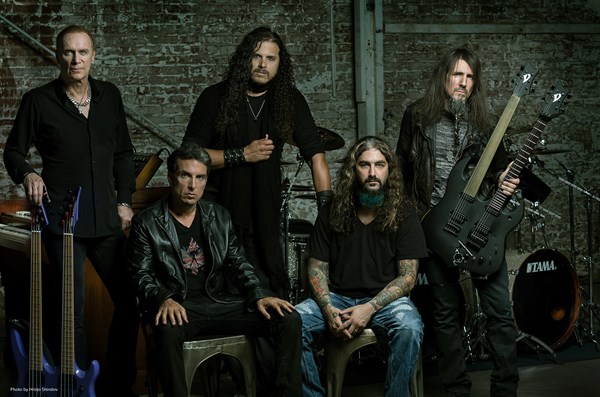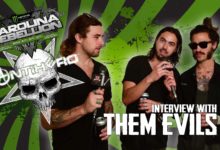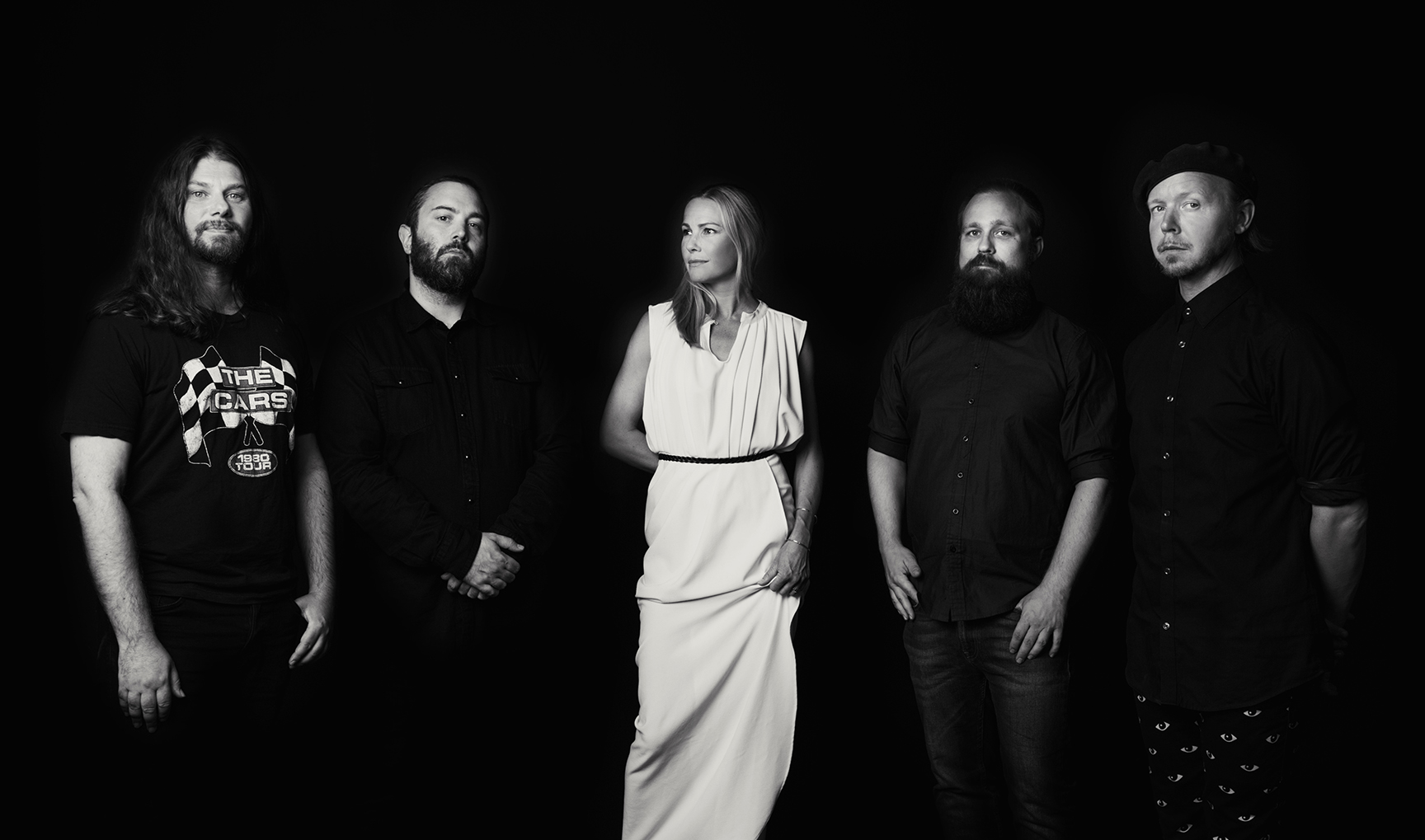Corky Laing started his life in 1948 as the youngest of five siblings in Montreal, Canada. His early bands enjoyed a good local following, opened for many of the popular British invasion acts and, ultimately, got a record deal with Atlantic Records in New York. Through the teenage summers, his band was a regular on the Island of Nantucket, Massachusetts and frequented clubs in New York City. In September 1969, his life changed for good when Mountain happened. There started a few crazy years of rock mayhem. Mountain was followed by West, Bruce, and Laing – a supergroup featuring Leslie West, Jack Bruce and Corky that was destined for greatness but brought to an untimely end by the darker forces of the music scene. After West, Bruce, and Laing, Mountain continued to tour and record on and off. The months and years off left Corky with plenty of time for his own musical explorations and other careers. He released a solo album, almost set up another supergroup, worked in a driving service and in real estate, had a senior position at Chappell Music and became a vice president of A&R at Polygram, Canada. During his career, Corky has played, written and toured with the who’s who of rock. Keith Moon was a close pal, and Levon Helm, a mentor, and friend. Eric Clapton played on his solo album and Tony Williams recommended to Jack Bruce thatCorky should be included in West, Bruce, and Laing. Corky Laing All-Star Show Band included Mick Taylor, Lester Chambers, and Meatloaf. Corky has written, among others, with Peter Frampton, Mick Jagger, Ian Hunter, Mick Ronson, and obviously, with Leslie West, Felix Pappalardi and Jack Bruce. At the Lone Star Café in New York, he partied with the likes of Robin Williams and John Belushi. However, Letters to Sarah (Polite Bystander Productions, 2019) is a rock autobiography with a difference. In addition to the exceptionally honest and endearing voice of Corky chronicling the ups and downs of his life, there are excerpts from dozens of letters (out of the c. 200) that Corky wrote to his mother, Sarah, between the years 1963 and 1997. She had saved them all. The letters were a way for Corky, away on the road for years on end, to keep in touch with his roots and also, to make sense of his life. This continues in Letters to Sarah, as Corky relives the first 50 years of his life, up until his mother’s passing in 1998. The book opens with a Foreword by the incomparable Kinky Friedman. It was written together with Corky’s manager and partner, Tuija Takala, Ph.D., who is a widely published academic author and who, initially discovered the letters to Sarah tucked away in a box at Corky’s rehearsal studio.
ANTIHERO: What prompted you to write the book? Was that something you were thinking about for quite some time or was it something that maybe somebody suggested to you?
Corky Laing: I’ll tell you exactly what it is and what happened , my partner and now my manager, Tuija you’ll see as a co-writer on the book, she and I were talking, she was a little upset when she went to Wikipedia and she felt that there was hardly anything there and factually most of it was incorrect. So she said, maybe we should do some sort of memoir. This was about five years ago, and I said, okay. I was a little reluctant because Mark, a lot of rockers, a lot of people are writing their memoirs. I thought it would just get lost. Yeah. So two years she says, well, let’s think of an approach. So we had these ideas, fictional ideas, and then while I was rehearsing or project with her in my rehearsal place, my mother had sent down boxes of storage things that she put away before she passed.
And I didn’t take any notice of that, you know? Yeah. Just stored it. And there was a big box of letters that Tuija had found while she was, you know, walking around and we were rehearsing and she said, look what I found Corky. And there were letters that I sent to my mother over a 30 odd year period. From the time as a teen, I went on the road with my local band and I wanted to keep, I wanted to keep in touch with her because even though I was away on the weekends and we played these tertiary markets, you know, in Quebec and some backwoods kind of places and I’d be lonely. I would decide to write to her and to digress a bit, I come from a very large family. So even to get noticed, Mark, I figured, I would just keep in touch and I would write these letters on the road, which did get lonely wherever I was.
I mean, from the time I was in the Notel motels with the local band, you know, stuffed in a room all the way through to where I ascended to Mountain and we were playing the Carnegie Hall’s and we were playing, then we flowed into West Bruce and Lang. So I was very fortunate. But during that period I never stopped writing to her because I wanted to stay tethered to the family. I sort of think of it as a family book because you know from as a musician and also a kid, you know, as a rite of passage. However, you put it, of keeping in touch with this family. I’m the baby in the family and I thought they’d forget about me. So there you go with the purpose of the book, which was to use the letters Mark as a time clock over the 30 years, you know, incidentally, here’s a letter and then I would embellish it or I will tell more about where I was at that time, my emotional feelings, you know, confessions, all these things, the evidence of what I was doing right and wrong.
And my mother saved these letters. Mark, I never knew that she was going to save the letters, but then Tuija found these letters and we said, wait a second, this could be a cool idea. And maybe she thought it wastoo, I didn’t make too much notice until we started reading them And I realised, wow, it’s kind of cool. It’s like talking to myself, which by the way, I do a lot and I think a lot of people talk to them himself, if you know what I mean. So are you getting the idea of what happened over five years? I did a lot of projects over in Finland and during that time we would have take our time and on some of our days we would just write the book longhand and then she would transfer it to the computer and it started to make sense, you know, the story was there, you know, that was the life I was living and it was chronicled by way of my mother’s saving of these letters.
Yeah. So, it was out. How do you say it was a propitious moment that as the writer you just just gotta be impressed? Point is, .. it worked. The book in itself, we found ourselves, you know, like flashbacks. If its letter from 1966 when you know, I ran into Jimi Hendrix and I told my mom, you’re not going to believe who I ran into. In those days, Jimi wasn’t a real star yet anyways. I don’t want to ramble on too much. But the idea, I think you get the idea if it’s a kid, you know, it’s coming of age. There it was, it was like a coming of age story, you know.anyway, I don’t know how much more to say on that topic, but I think you got it right, Mark.
ANTIHERO: I’m sure that it also dragged up some good and also some bad memories for you.
Corky Laing: Yes. Yes, it does. I didn’t mean for that to really happen. I figured the letters would explain things, but I don’t know how much you’ve actually dug in and read, but the letters were kind of emotional outlets, you know, and I’m talking to my mother in a very, uh, how do you say intimate way, you know, and not to be misconstrued, which she’s, you know, I mean love with her in a certain way. I love my mom, but I was opening up to her. So yes, there were parts and some of that was pretty intimate and uh, but I got pretty lonely out there, you know, I don’t care how much money you make or whatever, you know, those thousands of people don’t show up in the motel room or in the hotel room, you know, at two o’clock in the morning you’re alone. And, it’s a whole different, uh, posture. So, um, yes, good and bad things. But hey, that is life. One thing is just be glad I’m genuine. I hope you don’t mind my Shakespeare. Be fucking genuine and sincere, which as a transparent, shallow drummer than I am. I worked hard at it.
ANTIHERO: What about the selection of the material? I mean, was it difficult to select what went in the book and what you actually left out. It certainly sounds like you had a lot of source material to work with.
Corky Laing: Very, very, good point. You know, being again as shallow, transparent rock and roll drummer. I was thinking we put in a lot of those decadent things, you know like snorting ants off the cement sidewalk with Ozzy Osborne. I wanted to put in all that shit and she said absolutely not to on my partner is a Ph.D. She’s a professor at the University of Helsinki. She happens to love rock. She happens to love Mountain. She loved West and Lang. At least that’s what she told me. And I don’t suspect she was lying. But the point is is that there was a symbiotic relationship to that sort of covered any misunderstanding. She just said, I’d like to write a proper book, you know, that can hopefully, eh, I don’t know, inspire something. And I said this, I think I told her, what do you want people to walk away after reading? What would you like them to think? And to me, I would say if they got on the phone or wrote a letter to their mom after reading the book, I think I’ve succeeded. Yeah. In connecting. Right. I don’t want fuck this email shit, you know, write a letter longhand to your mom. She may never expect it from you, but if my book could inspire that, Cool.
ANTIHERO: Just what I want to ask you some general questions. I hope that you will forgive me if some of these are covered in the book. I haven’t actually managed to get a copy, so there may be some overlap.
Corky Laing: You didn’t receive a copy yet? . Oh, okay. Well that’s, I, that’s could be problematic, but I’ll deal with anything. At least you’re, you’re respectful enough to say that to me that you haven’t read it? You know in some interviews- these guys are, “yeah. Read the book on page 57 when you …” but I know that they have not actually read it. , you’re very respectful? I appreciate that. I think I will accept any questions you have as being, as being forthright.
ANTIHERO: Yeah. I think the problem is with me living in the UK are so it was a bit of an issue with posting over and ensuring that arrived in time.
Corky Laing: Yes. Well, I tell you what, we’ll make sure you get the book no matter what. Okay. Right. Um, I’m sure who is in touch with you was that Jeff Albright?. Yep. Yeah. Okay. He’ll get you a book arranged. He, he’s been terrific and I think timing-wise, you know, uh, he’s doing the best he can. So we’ll get you a book anyways, but carry on.
ANTIHERO: No worries. When did you first develop a taste and also realise that you had a talent for music?
Corky Laing: Okay. That goes way back,in terms of music, my mother and dad would dance in the kitchen next to the bedroom where my brothers and I lived. Yeah. We were really squashed in, I have triplet brothers, Mark and we, the four of us, we had these bunk beds and we were very squashed -but we were right beside the kitchen and my mother would get these Cuban records. In Canada, in Montreal we had no problem with Cuba and she would access these amazing Latin songs and music-you know, and they would dance in the kitchen and listen to the music like 11, 12 o’clock at night before they went to bed,that sort of turned me onto the feeling of music.
I saw my parents dancing well I didn’t see them actually, it was in the next room . I felt the vibe was really terrific and I saw the joy that they have listening though they weren’t musicians, they were irregular, good old fashioned parents. And that was a little bit of joy that they celebrated. And I think that turned me on. And then my sister started playing Art Blakey and the Jazz messengers, you know, on this phonogram that we had in the kitchen. So there was music in the air, so to speak. I started following a bit of the jazz thing and I guess I must’ve been nine, 10 years old. Then fast forward, and I was working at this country club along with my brothers who were serving tables. It was a restaurant kind of club and they had music and entertainment every weekend.
And the Lawrentians, which is just outside Montreal, was sort of a country club outdoors. And there was a stage and they would invite performers from the Catskills. Like they have comedians. and they’d have these bands, , these groups come up and up from the Catskills to Laurentian and the proximity was such that they were able to bring in these big acts. One of the acts that came in was a group called of The Ink Spots who were very big at the time. They were like The Temptations of their time. We’re going back tonight, nearly fifties mid-fifties so there I was, I needed a job. So I think I was like 12 or 13 I was sweeping the stage, getting ready for the show on a Saturday night.
And there was a musician strike Mark. So the musicians that were going to back these five guys did not show up. So there I am sweeping the stage and there’s a drum set getting it all setup and, and he’s really very talented. Five black guys, one with a guitar come over to me and said, boy, we are looking for musicians. And I said, for what? I understand sir, there’s a musician strike and I don’t know if they’re going to show up. And they went, ah, hell we going to do, he says, Yo, there’s that drum set over there. You think you, could assist- you’re brushing the stage. Maybe you could pick up a couple of brushes and provide some background beats. I’d never been on a drum set in my life, but there they were the beautiful, beautiful white set of drums. I found the brushes and then I sat on the seat and at nighttime I would just brush the snare drum, making it look like it was relevant.
But keeping in mind, here’s this little white boy, you know, playing drums behind The Ink Spots again at the time, they are big, you know.. There was all these beautiful ballads and Doo-wop. And so that was my first shot at playing in front of people. You know, and actually , if people are staring at me, Mark, and I’m going, wow, this is fucking cool. I didn’t swear at that age, but I’d say, I said, this is really cool so that is how I got it addicted to performing and having people actually watch me now. All I had to do for the next 30 40 years, we’ll learn how to play drums, which I did. Mark, I did, I, I concentrated on the drums. I’d be in my elementary school. You know, I got a pair of Bongos for a birthday and I play, I played “Runaway”Del Shannon’s song -you know, Eh, I love music because I was able to play the bongos and between you and I in those days, the bunkers was like a chick magnet, And they went, wait a second. Girls love this stuff. So that only enhanced it even more. So I bought more drums. I didn’t really just buy them I had to bust my ass and deliver papers and shovelled sidewalks just to make enough money to buy a damn snare, which I did by the way Mark. But it was a wonderful time in life because you had to do everything you could to celebrate the joy of playing drums. And Mark, I’ll just add this, well, I’ve got 13 coffees in me. You’ll never see a more beautiful thing in the world than a set of drums.
ANTIHERO: Okay? Yes. I mean you have pretty much answered this, do you recall hearing a song of yours on the radio for the first time?
Corky Laing: Yes. Yes, I do. Well, this song I first heard was they had a special radio station -, they to play Canadian content in Canada and I was in Montreal, I think I was, I think we had just finished recording “When I Fall in love.” And we lucked out with the record deal that Felix Pappalardi had already produced a record with the New York Philharmonic Violin section. Uh, Felix played the Piccolo and I remember it was the year that Penny Lane came out. You remember the Piccolo in that. Beautiful. So Felix played it in this was a beautiful production of When I fall in love and we used that Ahmet Ertegun kind of feel. Reagan was the president of Atlantic Records and he was auditioning Felix as a producer to see what he could do to a song that that Nat King Cole recorded years before.
So, we made a current version of that and I remember hearing it on Canadian radio in Montreal and, uh, it was thrilling, you know, to hear this and it was a beautiful production. Keep in mind that maybe sold four copies, but it was a beautiful production mark and people love the production in Canada and again, uh, I don’t how to far to go with that, except yeah, it was, it was quite a moment. Yeah. You know, you’re hearing it on this cheap little, you know, radios, Zenith radio, but it sounded huge to you. You know, it’s huge because it’s yours. But yes, I do recall.
ANTIHERO: Okay. music has been a major part of your life, but what do you do in your spare time? Or do you have any hobbies and interests away from music?
Corky Laing: Well, I never considered myself working, so playing, whether it was writing music, whether it was the performance, whether it was singing or whatever, I don’t even know where this spare time we’d come into it. Yeah. But if I wasn’t doing that, I love playing sports. You know, I love, I love skiing. My brothers were jocks. And my family and my triplet brothers. We had like a team, we would be like a hockey game, you know, cos the four of us and they were two years older than me and I kept up with them. I would say sports. I would say sports would be the one thing know, because as a drummer, one has to stay in physical shape. Sure. You know, so yes, I would try to stay active. I love swimming. I love all this stuff that contributes to my, to my physicality. So that would be an answer to that.
ANTIHERO: Of course, the band Mountain had several breaks over the years. Changes in the lineup. Did you feel with hindsight that those were absolutely necessary?
Corky Laing: You know, uh, at the time these were the 80s mainly the 80s was when, uh, let’s put it this way, I’m going to go back and give you one of my favourite expressions, Mark. And you can use it to be a teenager in the fifties wished to via nobody to be a teenager in the 60s which to be in everybody. I was very fortunate in my life to be a teenager in the 60s but as I grew into the 70s those were high end, high-end years for me because I was playing with Mountain for three, four years with the original band. And then I joined up with Jack Bruce for three or four years. So that took care of the 70s but at the end of the seventies, you know the punkers came in. Yeah. And all of a sudden, we were dinosaurs, all the, you know, all the heavyweights if I may say so from the 70s.
They broke it down and they wanted to get that 16th beat. Two, two, two, two, two, two, two, two. You know, it was all, it went from four plodding to 16th notes and you had to play fast and you had to get rid of any kind of what uh, how do you say pretension. Yup. Cause you want to get down and dirty as a punker. At the time I hooked up with a, a couple of guys and we played at CBGBS, which was the punk club. The name of that band was…it was a lot of fun and, but it changed everything. You know, that’s why you put an end to the hard rock metal. Yup. That was over in the early eighties and it did come back with Spinal tap, but basically, there was, we, you know, we were like the left tackle on the football team.
We didn’t get noticed as a band. Our time was up in those days, in the 80s so less than I would take these dates. You know, at the time Felix was, was shot dead by his wife. Yeah. So less than I decided that we still have to eat this is what we do, right. Mark, we’re the players, forget the celebrity shit we just had, we’re musicians we had to play. So yes, we would, I would say we were salvaging a few things in those days and then we’d get a couple of record deals where if people thought they make a few bucks on the band and we cut a few not so great records and it was an up and down park, which by the ways in the book it has those, uh, you know, it was those sweet bittersweet gigs that came here and there. But I would say it’s being on the verge of salvage or being desperate. See it had to do with paying the rent. Yeah. So if you’re asking me that, I have a good time doing that. I had a good time playing, but there was no question they were tertiary markets and we were compromising everything we knew, you know, at that time. Yeah. When I say that, I mean of course we weren’t too excited as a result. We didn’t play with the kind of energy and enthusiasm that we had played with in the 70s.
ANTIHERO: You mentioned there the difficult period for heavy rock and heavy metal as a musical genre and it is still going today-, how do you explain the fact that that it’s actually rejuvenated and it’s still going? Heck probably even stronger than it once did.
Corky Laing: Well, I, if I hear you right Mark, it came and it went , during the 80s. Yeah. The hard rock thing was just not there. And then when the 90s came in, your memory, with all the west coast bands Yeah. Your garage bands. Well, they were on the, on the verge basicallyof extinction-, with Nirvana,and those kinds of bands. That’s what was happening in the 60s. The self-contained rock bands with no, you know, with no poster, no big production. It was what we did in the 60s, you know, in terms of starting out. So, it just went into a cycle, you know. I thought of Mountains being more of a reactionary band.Like a Clash sort of a thing You know, we had a couple of ballads- which were pretty good, which we liked, but basically, I don’t know if heavy rock ever went away., .
Pearl Jam, uh, you know and a few of the west coast Seattle bands, they went back to that rock thing, you know. then I guess each decade had their own pulse, their own timing. And of course, during those decades it was the drummer until you had the programmed drums or it was the drummer that was off the click track that would play with feeling. So in the 60s you had great drummers in the 70s he had great drummers, rock drummers, and I’m, I’m talking about. And then all of a sudden the eighties, nineties, all of a sudden you had programming. So the categories, they split up, you know, you had the disco thing, which to me had nothing to do with drumming. That was just dancing, which is fine. And then you go 2000 and everything came back again as far as I’m concerned. And I go by the fact that we started getting booked again. At least I did. You know, and if you really dig in, I spend a good deal of time in Scandinavia because, well, first of all, my partner lives in Finland.
So, I spend time playing shows in Helsinki because those people, they love the heaviness, they love the feel of the original sort of rock bands. So, it was a wonderful thing for me because I was getting calls to go over to Helsinki or over Sweden or Germany. We’re doing a tour in the fall of Germany. This is our third tour of Germany. And I’m playing myself with the guys and playing Mountain songs, playing West ,Bruce and Lang. And these people remember those songs, which is terrific. You know, they’re showing up, you know, to listen to the repertoire that 30, 40 years old, but they still love it and they pay money to see it. And my job is to play it as good as I ever played it before. So coming to the, you know, the centennial thing we’re playing, we’re playing out is 2019 and we’re still booked, which is amazing. Mark, when you get a call to play as a musician, that’s great. You know what I mean? If you don’t get a call, that’s not so good, you know, because you got to go to people that want you to play for them. And I’m rambling on again.
ANTIHERO: Corky, there has been a hell of a lot of changes since you first started out in the music business. I just wonder what you feel are the pros and cons of being a working musician today in 2019?
Corky Laing: well, I feel great. Number one, I’m like I just said it comes full circle. Yeah. You know I think people recognise, I used the word often click track, you know because the best drummers you ever heard didn’t play to a click track. You know, Keith Moon, Ginger Baker, andJohn Bonham, you name the drummers of that era. And I’m proud to say I was part of that, and I don’t compare myself to their talent, but one thing I did, it did, I will compare, I will relate to is we weren’t tied to a metronome and other words. We had the freedom in our heart and in our soul to play how and paid play the time signature that we felt. So that was a huge bonus and we were very fortunate to, uh, to be around for those days. I’m bringing that up now because it seems that’s what people want right now.
Musicians, these days, they’re not making a lot of money on record, on recordings in general. It’s a lot the businesses fucked, excuse my language again, but performing never goes away, especially when, again, you’re not on a click track unless you’re playing a disco. Right? Yeah. So I considered a tremendous honour to be able to play free and play with some great musicians who if you go online, you’ll see who I’m working with. I don’t have to start spelling it out. But, and when you talk about the difference in music these days, I don’t really relate to it, you know, in terms of criticising, making a judgment about it. If people are playing and they’re enjoying, if these guys are out there, you know, sitting and rocking and plan and they’re loving it, fuck great. You know, great. And it could be, you know, it could be an old song, it could be a new song, but it’s all been done before.
The only thing you can do is bring some passion and joy to your interpretation of the repertoire. Again, I’m very fortunate, you know, I was, I was part and parcel of writing some songs that had been around for 40, 50 years. I mean, Mississippi Queen, I would never know that that would still be around, you know, you don’t know this when your record them – you just play it and you get the best records. That’s 1969 again, 50 years ago. And I only feel like I’m 25 years old, Mark. So go figure. You know, I wrote the song before I was born. There you go. Just a couple then. By the way, can I guess Mark, you’re from Scotland, I imagine, right?
ANTIHERO: Not that far away, actually. Northern Ireland.
Corky Laing: oh, okay. Okay. Sorry about that. What a great fucking accent. I actually understand you. I know I played over there. We went over there to the Southern part, right? Yeah. way down in Cork. And I remember us going to these bars and it’s take it be great if I understood what they were talking about, but they are so enthusiastic, you know. I’m sorry. I should never have targeted big stuff-like accents- but Northern Ireland you should give cut me some slack, you know,
ANTIHERO: A couple more to finish. Just returning to the book, do you see yourself going out and doing some sort of promotional book tour? Is that something that you’re maybe considering or maybe not?
Corky Laing: Yeah, I am doing precisely that. Actually, we just came from North Carolina. We did a couple of in-stores, oddly enough to Helsinki and Porvoo that’s in Finland and we just came up from North Carolina. I said that we’re on, yes, we are on a tour of in-store book signings as well as playing some shows were playing New York on Wednesday. We’ve got this great little music hall we’re playing and we will sign books and yeah, we were doing that now. We were going this week we’re going to Nantucket island at further for their best of their book festival, which apparently is one of the biggest book festivals in America is really popular. We’ve been invited there because of my association with them. Well, but first of all, because its mentioned that token sleigh ride. Yeah. I have a lot of history in Nantucket, which is in the book.
Yeah. So, yes, we are doing that presently and continue to do that throughout the summer because we’re touring with the legends of Woodstock, which are, you know, in the South Houston, Dallas, they’re putting together these little mini-festivals, with I guess some of the original Woodstock players. And at the same time, Mark, we will go to the bookstores in these cities and do some in-store at the same time.Weare going over overseas to Germany and France and Romania. We’re going to flog these babies. Yeah, we’ll do that. And because we’re getting such a great response, and by the way, I really appreciate one thing, but you know, I’m in no rush right now, but when you get off the phone, i will get you a book. I’d love to see your response to the book. If you can get in touch with Jeff and he’ll pass it on to us wherever we are on the planet. So because you’re a writer and I’m always curious because hopefully, you can be brutally honest and if you’re not, then I’ll be really upset with you. Mark. You’ve got to be brutally honest in this world. So, next question. I’m sorry. yes, we are doing stores.
ANTIHERO: Just a final one. Corky you have done many, many interviews over the years, but I just wondered if the rules were reversed and you were sitting 1-1 asking the questions, who would be your ideal subject.
Corky Laing: Would this person be living or living or dead?
ANTIHERO: Maybe somebody that’s inspired you.
Corky Laing: Well obviously it would be Elvis Presley. Yeah. But I don’t know that he’d have too much to say. You know, he was a southerner who lucked out becoming a huge star. Ah, that’s interesting. I was fortunate enough to have a good friend and I’m not name dropping, I hope you don’t pick it. Leon Helm who I actually hung out quite a bit with, stayed at this farm and we would talk a lot, but he was one of the most interesting personalities that I’d ever met. The fact that I was good friends and he does the foreword in the book. He does, I wouldn’t say forward, but he does a bit of a couple of lines in the book. So Leon Helm would be one. And the trouble is, I got to tell you, a lot of those, the, my heroes are dirt napping, you know, they’re not about here.
I listened to the music, but they haven’t got too much to say right now. Yeah. Does that answer your question because it’s a real, that’s really a wide-open one. Cause there are so many people, there are so many interesting people. , I think as a musician when we hang out, we pretty much interview each other in a different way. You know, it’s not official, but you know, you pick people’s brains and stuff. It’s like, it’s like, I forget who I was talking to but I said, and with my dad, I said that I want to grow up. I don’t want to be a rock drummer. And the answer was, well, you’re going to have to pick one or the other. Good question.
ANTIHERO: Thank you very much.

